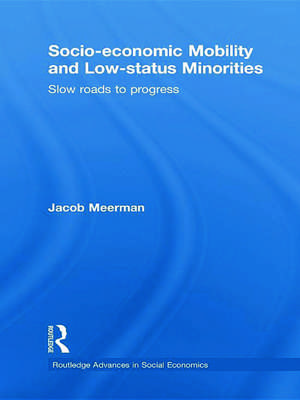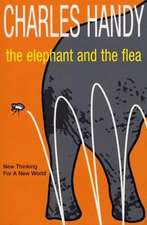Socio-economic Mobility and Low-status Minorities: Slow roads to progress: Routledge Advances in Social Economics
Autor Jacob Meermanen Limba Engleză Paperback – 17 aug 2011
Their slow progress has four causes: obviously discrimination and poor education, but also low economic growth and cultural heritage. Low growth limits revenues for schools as well as new job opportunities, and perpetuates traditional exploitative social relations and customs. Traumatic histories of enslavement or conquest may induce behaviours by victims that reduce upward mobility. Together these four interacting variables suggest a "mobility model" that explains the impasse. The book develops and applies this model to interpret and compare the mobility history of five stigmatized, low-status ethnic groups: U.S. African Americans, Japan’s Burakumin, Afro-Cubans, India’s Dalits (Untouchables) and Bolivia’s Highland Indians. The book also compares actions by governments and the groups themselves to overcome barriers to progress, including job quotas, boycotts, mass protests, and the unique kangaroo courts of Japan’s Burakumim.
Meerman’s unusual cross-disciplinary approach and fascinating comparative studies of success and failure will appeal to scholars, development practitioners, and advocates working on issues of discrimination, poverty, equity and inequality in an ethnic context.
| Toate formatele și edițiile | Preț | Express |
|---|---|---|
| Paperback (1) | 414.70 lei 6-8 săpt. | |
| Taylor & Francis – 17 aug 2011 | 414.70 lei 6-8 săpt. | |
| Hardback (1) | 1172.58 lei 6-8 săpt. | |
| Taylor & Francis – 28 mai 2009 | 1172.58 lei 6-8 săpt. |
Din seria Routledge Advances in Social Economics
-
 Preț: 386.77 lei
Preț: 386.77 lei -
 Preț: 310.08 lei
Preț: 310.08 lei - 18%
 Preț: 998.77 lei
Preț: 998.77 lei -
 Preț: 489.26 lei
Preț: 489.26 lei -
 Preț: 284.78 lei
Preț: 284.78 lei -
 Preț: 395.90 lei
Preț: 395.90 lei -
 Preț: 467.44 lei
Preț: 467.44 lei -
 Preț: 493.34 lei
Preț: 493.34 lei -
 Preț: 469.34 lei
Preț: 469.34 lei - 17%
 Preț: 257.68 lei
Preț: 257.68 lei -
 Preț: 389.38 lei
Preț: 389.38 lei -
 Preț: 466.49 lei
Preț: 466.49 lei - 17%
 Preț: 219.59 lei
Preț: 219.59 lei -
 Preț: 482.74 lei
Preț: 482.74 lei -
 Preț: 481.20 lei
Preț: 481.20 lei -
 Preț: 415.67 lei
Preț: 415.67 lei - 18%
 Preț: 1002.63 lei
Preț: 1002.63 lei -
 Preț: 468.36 lei
Preț: 468.36 lei - 15%
 Preț: 425.62 lei
Preț: 425.62 lei - 19%
 Preț: 269.39 lei
Preț: 269.39 lei - 13%
 Preț: 337.39 lei
Preț: 337.39 lei - 15%
 Preț: 428.00 lei
Preț: 428.00 lei -
 Preț: 447.51 lei
Preț: 447.51 lei -
 Preț: 445.22 lei
Preț: 445.22 lei -
 Preț: 384.27 lei
Preț: 384.27 lei - 26%
 Preț: 848.93 lei
Preț: 848.93 lei - 18%
 Preț: 1384.17 lei
Preț: 1384.17 lei - 18%
 Preț: 1060.25 lei
Preț: 1060.25 lei
Preț: 414.70 lei
Nou
Puncte Express: 622
Preț estimativ în valută:
79.35€ • 83.07$ • 65.66£
79.35€ • 83.07$ • 65.66£
Carte tipărită la comandă
Livrare economică 05-19 aprilie
Preluare comenzi: 021 569.72.76
Specificații
ISBN-13: 9780415694445
ISBN-10: 0415694442
Pagini: 296
Dimensiuni: 156 x 234 x 16 mm
Greutate: 0.42 kg
Ediția:1
Editura: Taylor & Francis
Colecția Routledge
Seria Routledge Advances in Social Economics
Locul publicării:Oxford, United Kingdom
ISBN-10: 0415694442
Pagini: 296
Dimensiuni: 156 x 234 x 16 mm
Greutate: 0.42 kg
Ediția:1
Editura: Taylor & Francis
Colecția Routledge
Seria Routledge Advances in Social Economics
Locul publicării:Oxford, United Kingdom
Public țintă
Postgraduate and UndergraduateCuprins
Part 1: Theory, 1. Introduction, 2. Stigmatized, Ranked, Ethnic, Low Status, Involuntary Minorities, 3. A Mobility Model for Stigmatized, Ranked, Ethnic, Low Status, Involuntary Minorities, Part 2: Case Studies, 4. The Dalits and Human Rights: The Indian Dilemma, 5. The Mobility of Japan's Bukakumin, 6. The Cuban Case: Can Stateways Change Folkways?, 7. Bolivia's Highland Indians: Oppressed by not Conquered, 8. US African Americans, Part 3: Comparisons, 9. Comparisons and Epilogue.
Notă biografică
Jacob Meerman, a Chicago Ph.D. in economics, is a Scholar in Residence at American University, Washington D.C. He has held several academic positions, most recently as visiting professor at the National University of Malaysia. During his quarter century with the World Bank, he carried out a pioneering study of who benefits from government expenditure and has extensive experience in developing projects including the main trunk highway in Bolivia, irrigation in Madagascar, and export crops in Rwanda.
Descriere
The book concentrates on socially excluded minorities looking at why such groups remain among "the poorest of the poor" and focusing on US African Americans, Japan’s Burakumin, Afro-Cubans, the Dalits of India, and the Quechua and Aymara of Bolivia.













